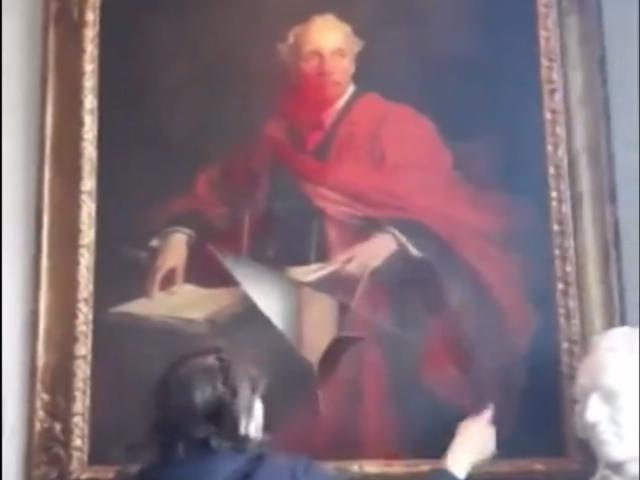At the prestigious Cambridge University last Friday, a grave incident unfolded that has reignited the contentious debates surrounding the historical Balfour Declaration. A pro-Palestinian activist, acting under the banner of the Palestine Action group, committed a shocking act of vandalism against a portrait of Lord Arthur Balfour. Balfour, a pivotal figure in British history, served as the Conservative Prime Minister and later, as Foreign Minister, issued the Balfour Declaration in 1917 that set in motion the creation of the Modern State of Israel.
Activists destroyed a historic painting of 'Lord' Balfour in Trinity College, University of Cambridge. pic.twitter.com/Ldk3EGyAvt
— Historic Vids (@historyinmemes) March 8, 2024
This Declaration expressed the British government's support for the establishment of a "national home for the Jewish people" in Palestine, a land that England had wrestled from the Ottoman Empire during World War One and was the administrator of in the years after. The Declaration was a move that has paved the way for the establishment of the Jewish State albeit on a fraction of the land orginally earmarked for its creation.
The activist’s method was stark and destructive: spraying the life-size portrait with red paint and then methodically slashing it with a knife. This act of defacement is not an isolated incident but part of a series of protests linked to the recent Israel-Hamas conflict. These actions have brought to the forefront the enduring divisions and the historical grievances that continue to fuel tensions between Israelis and Palestinians.
Pro-Palestinian protestor in England just destroyed a historic paining of Arthur James Balfour at Trinity College Cambridge using paint and a blade.
— Paul A. Szypula 🇺🇸 (@Bubblebathgirl) March 8, 2024
Balfour was a supporter of the Jewish people having a homeland.
Protestors who vandalize priceless art should get life in prison. pic.twitter.com/wfoKljuEg2
The Balfour Declaration, conceived during the waning days of Ottoman rule and at a time when Britain was a dominant global force, has long been a point of contention. Palestinians have repeatedly called for an apology from Britain, viewing the declaration as the genesis of their ongoing displacement and suffering. The declaration set the stage for British Mandate rule in Palestine, ultimately leading to the establishment of the State of Israel in 1948. This momentous event was followed by a conflict that led to the displacement of over 700,000 Palestinians, an exodus that remains a central element of the Palestinian narrative of loss and injustice.
Palestine Action has vehemently criticized the Balfour Declaration, accusing it of initiating what they describe as the ethnic cleansing of Palestine by promising land that Britain allegedly had no right to allocate. This recent act of vandalism at Cambridge occurs amidst a broader national conversation in the UK, prompted by Prime Minister Rishi Sunak, on the need for stricter regulation of protests, especially those that escalate into hate speech or threatening behavior. Sunak has affirmed the right to protest while unequivocally condemning the endorsement of Hamas, which the UK classifies as a terrorist organization, through protest actions.
"The slashing of the portrait of Lord Balfour at Trinity College, Cambridge, is a shocking development," say the editors of the @NewYorkSun. "Not since the Taliban destroyed the Bamiyan Buddhas in 2001 have we seen such an act."
— Dovid Efune (@Efune) March 10, 2024
"The destruction of the portrait of Balfour was…
The incident has drawn a sharp rebuke from Cambridge’s Trinity College, which lamented the vandalism and extended its support to community members affected by the event. The political reaction has been swift and condemnatory, with figures across the spectrum denouncing the attack on the portrait of Lord Balfour as a senseless act of vandalism. Palestine Action, however, has stood by its actions, sharing footage of the event on social media and defending its protest as a statement against what it perceives as ongoing British complicity in the colonization of Palestine.
The portrait, a work by Philip Alexius de Laszlo completed in 1914, not only represents a significant piece of art history but also serves as a symbol of a pivotal moment in the complex and often painful history of the Israeli-Palestinian conflict. Deputy Prime Minister Oliver Dowden and Lord Walney, the government's adviser on political violence and disruption, have expressed their outrage, emphasizing the need for legal consequences for such actions.
I would like to ask everyone defending this one simple question: how would YOU feel if someone vandalised YOUR great-grandfather’s portrait like this — at YOUR alma mater? I have never been less proud to be a Trinity alum. https://t.co/il0aa9v5MN
— anna balfour ✨🇬🇧 BAIT SATIRE LARP IMPERSONATION (@thems_thebreaks) March 9, 2024
As the investigation by Cambridge Police progresses, with officers collecting evidence but no arrests made yet, the incident underscores the enduring and deeply rooted historical grievances that continue to shape and challenge the discourse on peace and justice in the Middle East. This act of vandalism at Cambridge University thus not only represents a confrontation with a historical figure and moment but also highlights the ongoing struggles over memory, identity, and justice that continue to divide communities and nations.


